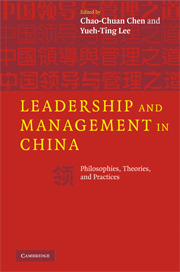Book contents
- Frontmatter
- Contents
- List of figures
- List of tables
- List of contributors
- Preface
- Acknowledgments
- Introduction: The diversity and dynamism of Chinese philosophies on leadership
- Part I The Confucian foundations
- 1 The Confucian and Mencian philosophy of benevolent leadership
- 2 Bridging Confucianism and Legalism: Xunzi's philosophy of sage-kingship
- Part II Alternative traditional Chinese leadership philosophies
- Part III Modern Chinese leadership theories and practices
- Index
- References
2 - Bridging Confucianism and Legalism: Xunzi's philosophy of sage-kingship
Published online by Cambridge University Press: 14 May 2010
- Frontmatter
- Contents
- List of figures
- List of tables
- List of contributors
- Preface
- Acknowledgments
- Introduction: The diversity and dynamism of Chinese philosophies on leadership
- Part I The Confucian foundations
- 1 The Confucian and Mencian philosophy of benevolent leadership
- 2 Bridging Confucianism and Legalism: Xunzi's philosophy of sage-kingship
- Part II Alternative traditional Chinese leadership philosophies
- Part III Modern Chinese leadership theories and practices
- Index
- References
Summary
Known as an “impure” or “realistic” Confucianist, Xunzi emerged as the great thinker who bridged Confucianism and Legalism. In this chapter, we first introduce Xunzi's philosophy of human badness and the importance of self-cultivation. We then analyze Xunzi's philosophy of community, social distinctions, and a system of ritual and conduct propriety. Third, we analyze Xunzi's philosophy of sage-kingship as the role model for self-cultivation, employing the virtuous and the talented, and building culture. Finally, we discuss his contributions to leadership theory and practice in China and in the world.
Historical background: reconstructiong order
Xunzi (c. 313–238 BCE) was a renowned thinker at the end of the Warring States Period and was the teacher of two eminent politicians, Hanfei (whose Legalistic perspective is featured in Chapter 4 of this book) and Li Si. Xunzi's last name was Xun and his first name Kuang. However, instead of Xun Kuang, he has been respectfully referred to as Xunzi, Master Xun, with the suffix zi meaning “master.” Xunzi is also called Xun Qing, with Qing suggesting the status of a high official. In the Wade–Giles system, he is also referred to as Hsün K'uang, Hsün Ch'ing, Hsün Tzu, or Hsün-tzu.
Xunzi was both erudite and versatile, having studied in the town of Jixia in the state of Qi. The Scholars' Palace at Jixia was at that time the place where scholars of different groups gathered, and it thus became the center of academic studies.
- Type
- Chapter
- Information
- Leadership and Management in ChinaPhilosophies, Theories, and Practices, pp. 51 - 80Publisher: Cambridge University PressPrint publication year: 2008
References
- 7
- Cited by



